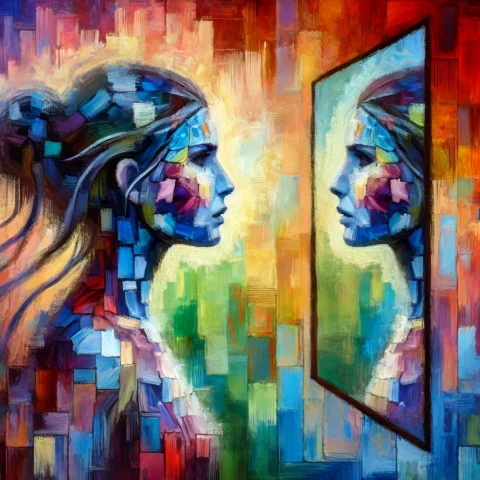As I reflect on the past four decades of my life, I’m struck by the profound impact that a single encounter can have on one’s trajectory. It’s been forty years since I first met a mentor whose influence on my life cannot be overstated. At that time, I was in my early twenties, navigating the tumultuous waters of early adulthood, trying to understand who I was and what I stood for. My mentor’s approach wasn’t about imposing their beliefs on me; instead, they taught me how to uncover the driving forces of my own consciousness and consciously craft my values. This journey of introspection began then, but now, at sixty, I find myself reflecting once more on these values to see what still serves me and what needs to evolve as I step into the next phase of my life.
 Early Values and Their Origins
Early Values and Their Origins
When you’re young, your values are often a reflection of your upbringing, the influence of your family, friends, and societal norms. For me, some of these early beliefs were both empowering and, in retrospect, deeply constraining. These formative values shaped my early years and set the stage for the personal evolution that would follow.
Nothing Is Impossible
One of the strongest values instilled in me was the belief that “nothing is impossible.” This was meant to be encouraging, to foster determination and resilience. It did just that but also created a relentless sense of responsibility. If something could be done, then I must be able to do it. Failure wasn’t an option; it was a personal flaw, a lack of effort or sacrifice.
This mindset drove me to push myself harder, often to the detriment of my health and relationships. The line between determination and self-destruction blurred, as I sacrificed more and more in the name of duty and responsibility. While this belief propelled me to great heights, it also came with a heavy cost. I found myself constantly striving, never feeling satisfied with my achievements, always believing there was more I could do.
The pressure to live up to this impossible standard was immense. It led to sleepless nights, missed family gatherings, and a constant state of anxiety. I remember one particular project where I worked for 72 hours straight, fueled by coffee and sheer willpower, convinced that if I just pushed a little harder, I could achieve the impossible. The project was a success, but at what cost? My health suffered, my relationships strained, and I was left feeling hollow despite the accomplishment.
Sacrifice All for Your Beliefs
Another value that shaped my early years was the notion that if I wasn’t prepared to die for something, I hadn’t earned the right to live. This extreme belief led to a willingness to sacrifice myself physically, mentally, and emotionally for causes I believed in. It also made me judgmental of those who wouldn’t go as far, despite my efforts to hide this judgment.
This value was a double-edged sword, driving me to great lengths but also fostering a harsh, unforgiving self-criticism. It was also a form of communal narcissism which took a fair few years to work out of my system but which was greatly aided by the humility rapidly experienced in the proximity of my mentor.
I recall a time when I was involved in a humanitarian project in a conflict zone. I was so committed to the cause that I disregarded personal safety warnings, convinced that my dedication would somehow protect me. It was only after a close call with a landmine that I began to question whether this level of sacrifice was truly serving the greater good or if it was a form of ego-driven martyrdom.
Love Thy Neighbor but Life is Hard
On the other hand, the value of loving thy neighbor, deeply influenced by my grandmother, instilled in me a sense of compassion and responsibility towards others. This principle extended to all living beings, emphasizing kindness and empathy. However, it often clashed with another value from my mother: that life is hard, and survival sometimes requires depriving others.
This internal conflict between empathy and survival instincts created a constant struggle within me, shaping a complex approach to life’s challenges. I found myself torn between wanting to help everyone and the pragmatic realization that resources were limited. This tension manifested in various ways throughout my life, from career choices to personal relationships.
For instance, in my professional life, I often grappled with decisions that would benefit the company but potentially harm individuals or communities. The struggle to balance these competing values led to many sleepless nights and difficult conversations with colleagues and loved ones.
 The Turning Point: Meeting My Mentor
The Turning Point: Meeting My Mentor
The encounter with my mentor marked a significant turning point in my life. Their approach to teaching was unlike anything I had experienced before. Instead of dictating what I should believe or how I should act, they encouraged me to look inward and question everything I thought I knew about myself and the world around me.
One of the first exercises my mentor had me do was to write down all my beliefs and values, then question each one: Where did it come from? Was it truly mine, or had I inherited it without examination? This process was both liberating and terrifying. I realized that many of the values I held dear were not my own but rather a collection of ideas I had absorbed from family, society, and culture without critical thought.
My mentor introduced me to various philosophical and spiritual traditions, not to convert me to any particular belief system, but to show me the diversity of human thought and experience. They encouraged me to read widely, from ancient wisdom texts to cutting-edge scientific research, always with a critical eye and an open mind.
Perhaps most importantly, my mentor taught me the value of experiential learning. They challenged me to test my beliefs in the real world, to live my values and see how they held up under pressure. This approach to life as an ongoing experiment became a cornerstone of my personal philosophy.
Forty years later, I find myself once again reviewing my values, considering what still serves me and what needs to evolve. Some of those core driving values and beliefs which have framed the last 40 years, the decisions I’ve made and the type of person I’ve become as I stand here now are:
See Oneself as an Experiment
I view myself as a subject in a lifelong experiment, constantly testing theories, models, and beliefs on myself. This approach has helped me refine my understanding of what works and what doesn’t, treating life as a series of hypotheses to be tested and adjusted.
This value has led me to embrace change and uncertainty with curiosity rather than fear. When faced with a new challenge or opportunity, I ask myself, “What can I learn from this? How can I use this experience to grow?” This mindset has allowed me to turn even setbacks and failures into valuable learning experiences.
Serve All Humanity
This idealistic yet grounded value has driven me to focus on solutions that benefit all humanity, rather than pursuing personal or business gains. The belief that serving others first would lead to adequate compensation has shaped my approach to work and life, fostering a sense of purpose beyond self-interest.
In practice, this value has manifested in various ways throughout my career. I’ve turned down lucrative opportunities that didn’t align with this principle and instead pursued projects that, while perhaps less financially rewarding, had the potential to make a positive impact on a broader scale. This approach has led to some of the most fulfilling experiences of my life, from developing sustainable energy solutions to creating educational programs for underserved communities.
Think for Yourself
The value of independent thought, informed by personal experience rather than external influences, has been a cornerstone of my journey. Questioning assumptions and seeking motivation from within has helped me navigate life’s complexities with a sense of authenticity and integrity.
This principle has sometimes put me at odds with conventional wisdom or popular opinion. However, it has also led to innovative solutions and a deeper understanding of complex issues. I’ve learned that true progress often comes from challenging the status quo and being willing to stand alone in one’s convictions.
Never at the Cost of Others
I strive to pursue ideas that benefit everyone without causing harm. This principle challenges the common business mindset that accepts casualties for the greater good, promoting a more holistic and compassionate approach to innovation and progress.
This value has been particularly challenging to uphold in a world that often prioritizes profit over people. It has required creativity, persistence, and sometimes personal sacrifice. But the rewards of finding win-win solutions and seeing the positive ripple effects of ethical decision-making have been immeasurable.
Play to Your Highest Level
In times of adversity, finding deeper meaning and purpose can inspire us to strive for excellence. This value encourages us to push boundaries and continuously expand our potential, viewing challenges as opportunities for growth and self-discovery.
I’ve found that when I approach life with this mindset, even the most daunting obstacles become stepping stones to greater achievement. It’s not about being the best compared to others, but about constantly striving to be the best version of myself.
Follow Your Own Path
Admiring others’ achievements is natural, but it’s essential to forge our own unique path. This value reinforces the importance of authenticity and individuality, reminding us that our journey is distinct and should be guided by our own principles and aspirations.
This principle has given me the courage to make unconventional choices and to trust my own instincts, even when they go against the grain. It’s a reminder that success is not about replicating someone else’s journey, but about creating a life that is true to one’s own values and vision.
Place Personal Integrity Above All Other Values
Integrity is the cornerstone of a fulfilling life. It requires the courage to stay true to one’s beliefs and values, regardless of external pressures or temptations. This principle emphasizes the importance of internal motivation and the pursuit of meaningful goals over superficial rewards.
Living with integrity has sometimes meant making difficult choices, such as walking away from opportunities that would have compromised my values. But it has also brought a sense of peace and self-respect that no external success could match.
Realize Yourself as One with the Universe and Humanity
Quantum physics teaches us that there is no true separation between individuals and the environment. This realization has profound implications for how I live and work, emphasizing the interconnectedness of all things and the importance of considering the broader impact of my actions.
This value has deepened my sense of responsibility to the world around me and has influenced everything from my environmental practices to my interpersonal relationships. It’s a constant reminder that every action, no matter how small, has ripple effects that extend far beyond our immediate perception.
 Embracing New Values for the Future
Embracing New Values for the Future
As I look towards the future, certain values are gaining prominence, guiding my actions and decisions in this next phase of life.
Balancing Rights and Responsibilities
The aphorism “Duties First, Responsibilities Must, Rights Reserved” encapsulates the delicate balance between individual rights and collective responsibilities. This principle highlights the importance of fulfilling our duties and embracing responsibilities as ongoing commitments, rather than burdens, ensuring that our rights are preserved through our contributions to society.
In practice, this means actively seeking ways to contribute to my community and the world at large, not just as a means to an end, but as an integral part of a fulfilling life. It’s about recognizing that our rights and freedoms are inextricably linked to our willingness to shoulder responsibilities and fulfill our duties to others.
Right Human Relations
Emphasizing empathy, understanding, and respect in all interactions, this value promotes a culture of cooperation and compassion. It encourages open dialogue and mutual respect, fostering a more just and harmonious society where differences are celebrated and common ground is sought.
This principle has become increasingly important to me as I’ve witnessed the growing divisions in our society. It’s a commitment to bridge gaps, to listen deeply to those with different perspectives, and to always seek the humanity in others, even in the face of disagreement.
The Ongoing Journey
Reflecting on my values over the past forty years has been a deeply introspective and enlightening process. The journey from my early beliefs, shaped by family and societal influences, to the values I hold today, has been one of continuous growth and self-discovery. As I step into the next phase of my life, these principles will guide me, ensuring that I remain true to myself while adapting to the ever-changing landscape of life.
My mentor’s teachings have been instrumental in this journey, providing the foundation for a life of conscious self-exploration and value-based living. As I look ahead, I am committed to embracing these values, refining them as necessary, and continuing the lifelong experiment of understanding and improving myself.
The path is ever-evolving, but the core principles remain steadfast, guiding me towards a life of purpose, integrity, and service. I recognize that this journey is not unique to me – it is a universal human experience. We are all, in our own ways, navigating the complex terrain of personal values and beliefs, striving to create meaning and purpose in our lives.
As I reflect on the values that have shaped my life and those that will guide my future, I am filled with a sense of gratitude and anticipation. Gratitude for the experiences, both challenging and rewarding, that have brought me to this point, and anticipation for the continued growth and discovery that lies ahead.
In sharing this journey, my hope is to inspire others to embark on their own path of self-discovery and value-based living. For in understanding and living our values, we not only enrich our own lives but contribute to the creation of a more compassionate, just, and harmonious world for all.



